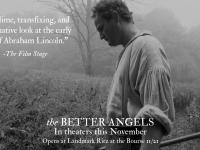At an isolated log cabin in the harsh wilderness of Indiana circa 1817, the rhythms of love, tragedy, and the daily happenings of life on the developing frontier shaped one of our nation's greatest heroes: Abraham Lincoln.
Using black and white cinematography to conjure an America where the land was raw, The Better Angels sheds new light on the formative years of the future president and the two women who molded him into one of the most revered men in American history.
Based on 19th-century interviews with Lincoln's family members, The Better Angels is the feature debut of A.J. Edwards.
On Saturday, 11/22, HSP will present a screening of The Better Angels, a new biographical film about the formative years of Abraham Lincoln during his years in Indiana. Directed by A. J. Edwards, the black & white film will be followed by a discussion led by HSP's Historian and Folklorist Dr. Daniel Rolph.
Tickets are $7.75 and purchasable at the Ritz at the Bourse; no reservations are needed.
More information, including the film's trailer, is available here.
What: An HSP-presented screening of The Better Angels, a new film about Abraham Lincoln’s early life in Indiana. HSP’s Historian, Dr. Daniel Rolph, will lead a discussion following the screening.
Who: Public are welcome to attend; tickets are $7.75 and purchasable at the theater; no reservations needed.
Where: Landmark Theater’s Ritz at the Bourse, located at 400 Ranstead Street, Philadelphia, PA 19106.
When: This Saturday, 11/22, the 3:40 p.m. showing.
About the film:
Abraham Lincoln’s youth in Indiana occurred during a period known as the Second Great Awakening, a time of enormous growth in several Christian sects especially the Methodists and Baptists, who preached a gospel of individual freedom and a personal connection with God. This movement started in the 1790s and gained notice in 1801 when 20,000 people attend a four-day revival meeting at Cane Ridge, Kentucky. At outdoor revivals and camp meetings throughout the country and especially along the frontier, traveling preachers encouraged public confession of sins and an emotional conversion that could include wailing, singing, speaking in tongues, shaking and falling motionless on the ground.
The Awakening was a period when utopian communities and new religions were established such as the Latter-Day Saints or Mormons, the Millerites, and the Harmonists, a communal society that settled in Indiana in 1814 just sixty miles from Lincoln’s home in Pigeon Creek. Other Christian sects expanded dramatically such as the Shakers, a highly successful network of communities known for their crafts but also their distinctive forms of worship that included singing and dancing with great intensity.
Less extreme but equally influential were the efforts of ministers like Lyman Beecher of Cincinnati whose children included Henry Ward Beecher and Harriet Beecher Stowe, author of Uncle Tom’s Cabin. There is a direct connection between the evangelical efforts of religious leaders and the large number of reform movements that flourished during this time including the abolition of slavery, temperance, prison reform, and women’s suffrage. The leaders of these causes combined their religious passion with political activism. Although Abraham Lincoln never formally joined a church, he came of age morally and politically during this time of social and cultural transformation in American life.
The powerful influence of religious faith is evident throughout The Better Angels. Lincoln's mother, Nancy, is described as "a believer." After her death, Abraham writes to a preacher to come to the Indiana frontier and give her "a proper burial." The Lincoln family prays at mealtime and Lincoln recites the Lord's Prayer with his classmates at school. At home he teaches himself to read the Bible and Pilgrim's Progress. His father is given the "honor" of building a new church and Lincoln is seen there lighting candles. Most important, he attends a service and hears the preacher's sermon that encourages "Christian benevolence" and reminds the congregation that the person who "supports the cause of some, promotes the good of all." These scenes suggest the way Lincoln's childhood experience of religion shaped the man he was to become.


